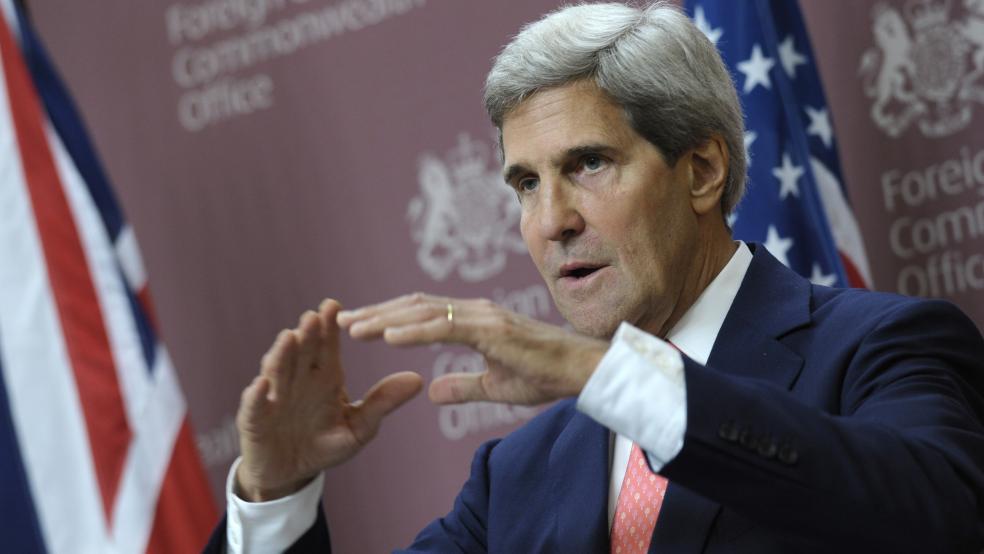The debate over striking Syria for Bashar al-Assad’s alleged use of chemical weapons took a bizarre turn  yesterday, with a possible diplomatic breakthrough that either represents shrewd statecraft or desperation.
yesterday, with a possible diplomatic breakthrough that either represents shrewd statecraft or desperation.
Secretary of State John Kerry told reporters in London that the United States was willing to back away from Assad if he gave up chemical weapons. The State Department later backed away from the statement, but not before Russia and Syria seized it as an opportunity to end the standoff. France has now drafted a U.N. Security Council resolution that would require Syria to give up its chemical weapons or face “serious consequences.” And Syria has now reportedly accepted Russia’s proposal to give control of its weapons to an international oversight body.
Whether Kerry purposefully mentioned the idea or misspoke is being hotly debated today. But whatever the case, it’s another instance of the White House sending mixed signals to lawmakers, the international community and the public about its position on Syria.
It happened again in the same news conference where Kerry floated the compromise. He told the press that any military action would be “unbelievably small, limited kind of effort.” Hours later, the president contradicted Kerry, saying, “The U.S. does not do pinpricks. Our military is the greatest the world has ever known.”
The inconsistencies are the latest in a long line of curious, contradictory and downright odd claims the administration has made since the Syria crisis began. Obama’s stated mission has been twofold from the beginning: Eliminate Assad’s chemical weapons capability and eliminate Assad from power.
The president and his administration have failed to articulate a coherent strategy for confronting Assad and selling the plan to attack him to the public and lawmakers. The White House’s mishandling of Syria exposes policy fault lines and leadership shortcomings, even if they accomplished their goal in the end. Here’s how it all went down:
- In August 2012, Obama called the use of chemical weapons in Syria a “red line” that would compel U.S. intervention. “We have been very clear to the Assad regime, but also to other players on the ground, that a red line for us is we start seeing a whole bunch of chemical weapons moving around or being utilized,” Obama said. “That would change my calculus. That would change my equation.” France and Great Britain made similar statements.
- On Dec. 28, 2012, Al Jazeera reported chemical weapons attacks against Syrian rebels.
- In March and April of this year, additional news outlets began to report chemical attacks. The U.S. stayed silent.
- On April 23, The New York Times reported that France and Great Britain had sent a letter to the United Nations, claiming evidence of chemical attacks.
- On June 13, the United States finally said it had evidence of chemical attacks. Obama did not take action against Assad.
- During the summer, the White House tried to rally international support for action against Assad. The UK parliament refused to authorize it, leaving the United States without its traditional partner.
- On Aug. 30, the French government of President Francois Hollande said it strongly supported the U.S. in its military intervention plans against the Syrian government and said the Aug. 21 attack “must not go unpunished.” It said a strike would have “deterrence value.”
- Also on Aug. 30, Kerry made a forceful argument for a military strike. Almost immediately afterward, Obama said he would seek congressional authorization for the action.
- At the G-20 conference in St. Petersburg, Obama denied saying he had set a red line. “First of all, I didn’t set a red line; the world set a red line,” he said in Russia.
- Since then, the White House has tried, and is reportedly failing, to win support for a Syria strike.
What happens next is anyone’s guess. But this much is clear: Obama set the red line. And advisers close to the president, such as U.N. Ambassador Samantha Power, are pushing him to follow through on an attack or risk the U.S. looking foolish and weak.
With Syria’s agreement, support for the strike isn’t going to be needed. And the White House can claim victory, as it accomplished its part of its goal: Syria will no longer have chemical weapons. But the road to this victory was long, winding and often difficult to understand.




